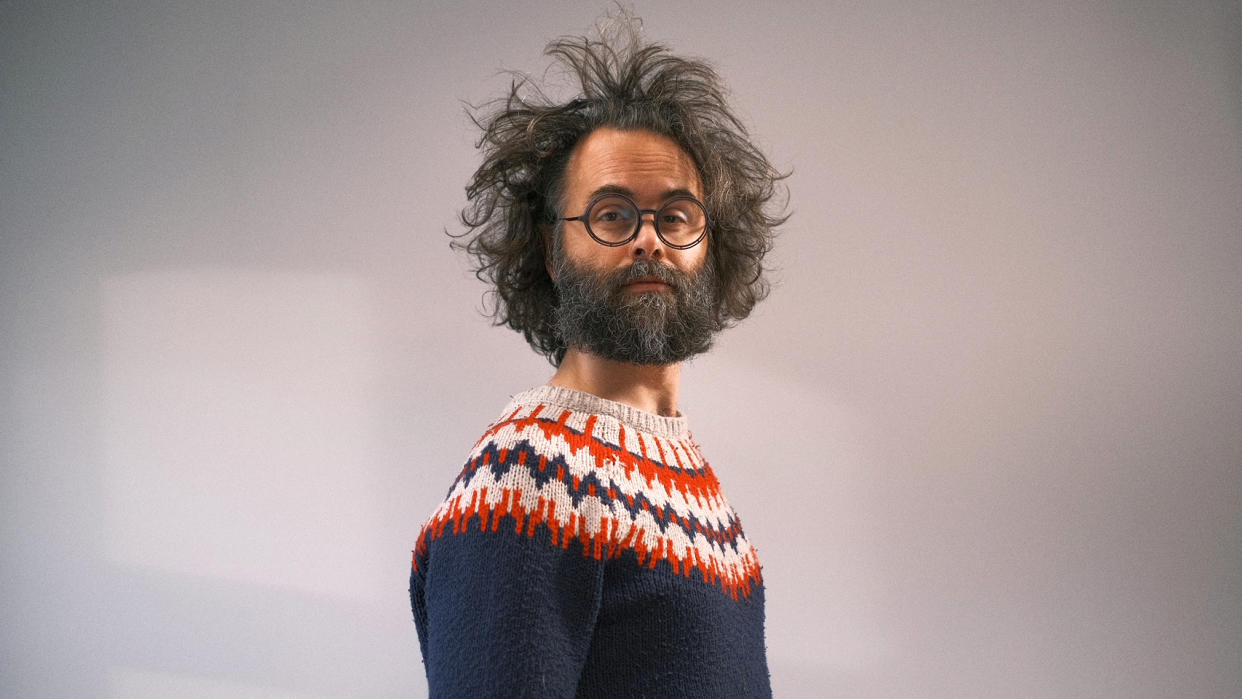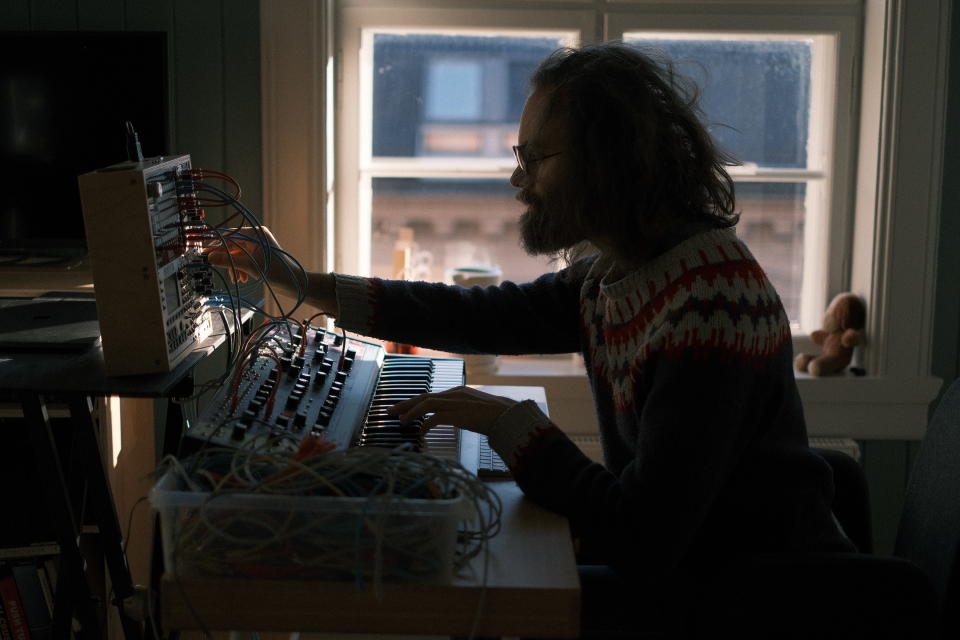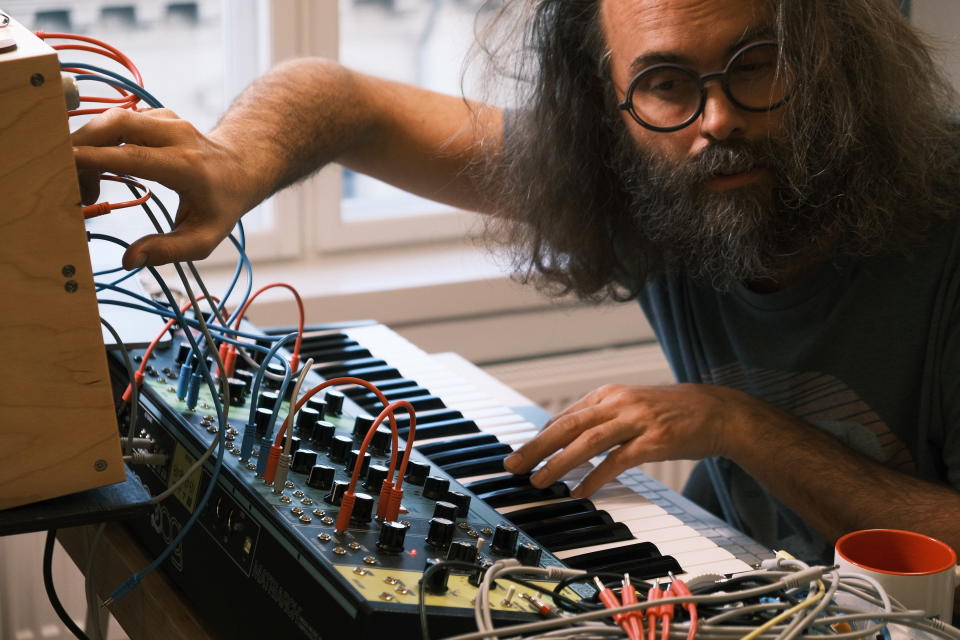Cuckoo: "Gear isn't the way I find inspiration. The gear isn’t what creates: it’s what’s on the inside that matters"

In our Synthfluencers series, we go behind the camera to meet some of the biggest YouTubers and content creators in the world of music technology.
“I forget everything about my real life when I enter the studio…” says synth expert and sonic explorer Cuckoo.
Music is clearly an all-encompassing world for Andreas Paleologos, perhaps better known as producer, tutor and content creator Cuckoo, one of music tech YouTube's most beloved and unique personalities. Laid-back, wild of hair and free of mind, he exudes the warmly off-kilter vibes of an eccentric professor, residing in a universe of wires, beats and technology one step removed from our own more conventional realm.
Cuckoo began his musical explorations using an Amiga 500, his creativity inspired by the video game music of his youth. Since he started exposing his synth experiments and love for electronics via the YouTube channel True Cuckoo, his videos have become a huge hit, racking up 167k subscribers and counting.
It’s not just music that has sustained Cuckoo - a freelance creative, he's worked in animation and produced videos for artists including Hanne Hukkelberg alongside content for MTV. Growing up as a self-confessed computer game nerd, combined with these experiences in visual media, has had a profound impact on his artistic development.
More recently, Cuckoo has dedicated himself to making videos, releasing music and even formed a synthfluencer supergroup with fellow knob-twiddlers Look Mum No Computer and Hainbach.
These days, he continues to flit between concocting video content, producing animations and experimenting with music technology, bringing a perpetual curiosity and a touch of offbeat flair to every creative path he chooses to pursue.
We caught up with Cuckoo find out more about his unique journey and the colourful sonic palettes of his creations…
How did you start your musical journey?
"It started with a fascination for video game music. Me and my friends kept challenging each other to play tunes you’d hear in these games on the piano.
"I got my first computer, an Amiga 500, purchased some Tracker software and started making music. We were a little gang who were into games and music, I had one friend who was into programming. When I was about 18, I aspired to be a composer and started experimenting with my first synth, the Korg M1."
Were there composers you were looking to for inspiration?
"In video games, I was inspired by a number of composers - Hiroki Kikuta (‘Secret of Mana’), Yasunori Mitsuda (‘Chrono Trigger’), Yuzo Koshiro (‘Bare Knuckles’/‘Streets of Rage’) and Hirokazu Tanaka (‘Metroid’).
"When the Super Nintendo and Sega Mega Drive came along, I was in awe of the music, the FM synthesis just blew my mind the first time I heard it."
How did you start creating content?
"I’ve always been a creator, even when I was a little kid. I’d always be drawing, if I saw a piano, I’d sit there for hours playing. Part of my core identity is working as an artist, and I spent at least 10 years doing it before I became more drawn to music.
"For me, everything is connected and all the creative outlets stem from the same source. As I worked with animation and visuals, I was getting increasingly inspired by music, to the point where I wanted to start my own project."
Have you had a strategy to grow your online audience?
"I’ve never had a strategy. I’m very intuitive, improvise everything and stumble my way forward. At one point, I saw that there was enough of a follower base to pursue the content side. I try to be consistent but that is something I struggle with. I can’t bring myself to follow a rigid plan. I’m all about intuition."

Have you any advice on increasing your audience?
"The top piece of advice that comes straight from my heart is to be yourself, to always honour your own ways. If you are constantly trying to be someone else or gas yourself up in a way that isn’t true, then you will get burned out. You won’t be able to maintain this fake persona. It’s important in the long-run to find yourself, amplify yourself and be honest with yourself too."
In terms of content, are there any challenges you need to overcome?
"Maybe consistency is the biggest one for me as I’m so spontaneous. Sometimes, ideas come to mind and they may take a couple of months to realise. For example, last year, I made a show with interactive visuals, it took a lot of time, longer than I was anticipating. It’s not procrastinating, it can just be heavy to start something bigger.
"I am doing tutorials at the moment. I like to see them as little pieces of art in their own right and I genuinely enjoy making them. I cannot bring myself to make a video about an updated product as I hate repeating myself. It’s so boring and I’m not looking for hype or views. If I were, then I’d happily make lots of extra videos about all this popular stuff but I’m just not interested in doing it."
What are your most essential pieces of kit?
"The most honest answer is the most boring one. Last year, Apple introduced a new MacBook Pro with an M1 Pro chip. Usually, I use Macs and have maybe four to five year update cycles. I was clinging on to my Mac, then it was time to update as I was editing so many videos in 4K quality, it was struggling a little. I bought the M1 Pro, and it was the biggest computer upgrade I’ve ever experienced in my whole life. I was blown away. It’s a boring answer but I use it a lot.
"In terms of music, the Expressive E Osmose is such a well put together, beautifully sounding and expressive synth. It’s taken me into uncharted territory. It’s very beautiful."

Do you have studio essentials?
"My studio kit usually reflects a live set I’m working on at that time, that’s my mindset. My current live set is based around Elektron’s Digitone and I love it, it’s exceeded my expectations on how I’m able to perform a whole set on it - that’s a go to right now.
"When I record, there is the UA 610A plug-in, a virtual preamp. It sounds incredibly good, there is something subtly vintage about how it enhances bass in a warm and full way. I often come back to the theme of tackling what I describe as the ‘mumble frequencies’. Very often, they are hard to control, but this 610A handles everything beautifully."
What is your relationship with technology? Do you place limitations on what you use?
"I struggle when I get too much gear for my live sets, I lose focus. Instead, I find it easier just to select one piece of gear and make a live set with that. If I need to play samples or add something else, I’ll bring in a second unit.
Knowing my gear inside and out is something that inspires me: I try to maximise the use of one device rather than trying to use everything
"On making or recording music in the studio, I’ve seen a lot of musicians who have everything set up and ready to go. I don’t have that kind of studio, maybe because I don’t see myself only as a musician, but also as a visual artist. So everything is stacked up on the side in a cupboard of shelf, and I only bring out what I want to play with. Maybe that’s creating friction in my process but overall, hopefully, that is keeping me focused.
"I also believe that knowing my gear inside and out is something that inspires me: I try to maximise the use of one device rather than trying to use everything."
Do you have any kit you class as a secret weapon?
"It’s a tricky question. The 610 A is great but is it a secret weapon? No. In terms of underrated or overrated gear or tech, I don’t really pay attention.
"It can be a dangerous route to follow. Of course, if you’re searching for new stuff, then you’ll be checking out a lot of options, you’ll find out what people think about them and eventually you’ll have your stuff, and do the most with what you have. Whatever you do, don’t be afraid to know your gear really well and get nerdy with it.
"One thing which I find useful is not being afraid of mixing acoustic with electronic sounds. Acoustic sounds have this natural way of finding place in a room. Electronics don’t have this, they come with a current and that will be captured somehow with a device. I really enjoy mixing these elements together."
How do you access music? Do you stream music?
"I have an Apple Music account but everything is presented to you in a commercial way. Everything is on there, you can find it somehow if you know where to look but it’s difficult.
"Great music has this spark of inspiration and integrity that is artistically true, and the algorithms, I’m not sure if they’re catching this just yet. Maybe they will get better but right now, I think they are more about genres and categorising music rather than this invisible quality that maybe only the listeners can hear and feel."
What do you think about AI?
"I was recently at an AI conference with tech students, innovations, entrepreneurs and I was the artist. As an artist, AI gases me up, as I’m a very easy going kind of artist, I adapt to what happens. When AI comes along, it’s challenging me, I’m here for it, I’m ready, it’s asking me questions: 'Human, you’re a slacker, I can do what you’re doing - can you take me on? Can you?'
When AI comes along, it’s challenging me, it’s asking me questions: 'Human, you’re a slacker, I can do what you’re doing - can you take me on?'
"I’m not scared of it as it’s asking me questions; what is it to be a human artist, what is so special about it. If AI is going to evolve, we’re going to have to live with it forever so it’s cool to have this challenger coming out of nowhere. It’s a reminder of how important it is to take yourself and your artistry seriously too. It’s baffling to see what it can do as it’s in its infancy and in terms of making meaningful use of AI, that’s for every human to decide for themselves.
"If you are using AI for creativity and directing AI to do their work, then you are entering the role of producer rather than creator. You ask AI to do this or that, get the results, then ask AI to adapt it to get a new version. This is how it produces work and there still needs to be a human to put the seal of quality on a product."
Do you have any advice for aspiring creatives?
"It’s very easy to resort to consuming instead of creating. Sitting there and watching a lot of stuff on your phone, then it’s time to go to bed. As creators, I think we need to monitor our own habits and be aware of them. If some of them stop you being creative, they should be very easy to spot, as long as you keep tabs on yourself.
"Take your phone and put it somewhere else. The physical relief is something I feel when I put my phone away, I should do it more often. There is also no creative motivation that is too dumb or mundane. Every kind is good enough in my book. Don’t wait for that super good legit idea, just go for it, it’s fun."
Do you have a favourite video?
"I made a video a long time ago with the Elektron Analog Four. It’s just a short video of me making a song, it’s no big deal but I found something in there, it was a lot of fun, and I really enjoyed the process of making a tune to camera. There was something about it, the expression was so positive. I really vibed off it and found joy in people discovering it. It’s very simple, but it sent ripples into the future of my channel and how I make videos."
Is every day different for you as a creator?
"Every day I go to the studio, it’s my full time gig to do this - and I always look forward to it. But looking at the gear is not the way I find inspiration - I see all the gear and it’s there but it’s not what creates, it’s more on what’s on the inside that matters. That’s an essential part of trying to navigate being an artist; you need to dig deep and find your flow."
Subscribe to Cuckoo's YouTube channel or support him on Patreon.

